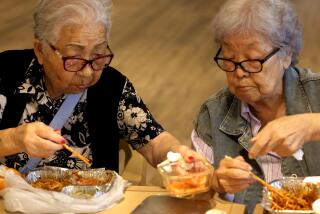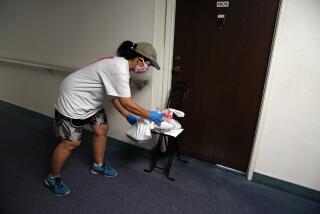Watching Out for the Seniors Who Don’t Eat
- Share via
In her article “Wasting Away” (April 2), Jane E. Allen missed something big--something I’m sure great care was taken not to let a reporter see. People waste away in nursing homes and acute-care hospitals a lot of the time because the aides who deliver meals refuse to provide assistance to feed them.
All aides do most of the time is slap a tray of food down on the long, high-rolling table by the patient’s bed. If they don’t eat it, gee, they must not have been hungry. Who cares if they can’t so much as reach it on their own, let alone feed themselves? No one bothers to feed a helpless patient in too many cases. The excuse aides give you when you question them is they don’t have the staff. Excuse me? Feeding patients is a vital and expected part of hospital or nursing home care for those unable to feed themselves and certainly should be fully provided at the astronomical cost per day at these facilities.
KAYE KLEM
Mission Viejo
*
My 95-year-old, Hungarian grandmother “wasted away” to about 70 pounds in a local nursing home. They gave every excuse about how she was doing fine, even though she was not eating and could barely stand up. I stepped in and had her doctor prescribe medication to increase her appetite--something he would not have done independently, since they all tried to deny the problem. That worked a little, combined with me feeding her each morning and evening, much coaxing and bringing her food she liked and grew up on, such as Hungarian goulash and chicken paprikas. I pity the elderly nursing home patients who do not have family advocates nearby.
AGNES HUFF
Los Angeles
*
When the elderly are not eating well, it is very important to look in their mouths. The elderly often have poor dental care and may be suffering from tooth decay, missing or loose teeth, mouth sores, gingivitis or poor-fitting dentures.
SANDI SIMONSEN
Anaheim
*
“Wasting Away” contained a very good clue as to why our elders do, indeed, waste away in senior-care facilities. The photograph of the plate of white and brown gloppy food tells the story. Food like that shown in your article is just terrible for anybody, let alone a fragile senior. Where was the salad? Where were the green vegetables? My mother was in a similar facility and ate very similar food. When my sister brought Mom home and began feeding her light, wholesome foods, Mom’s health improved enormously.
DAVID GROVERMAN
Newport Beach
*
My mother, who recently passed away, spent her last two years in a wonderful alternative to a nursing home, a six-bed board-and-care home. The caregivers took care of her and others around the clock, and she was loved and cared for like a family member. When she had to be hospitalized, they visited and fussed over her to be sure of her care. This lovely home in a nice neighborhood is the closest we could have found to having her with us in our home--a great alternative to a large, impersonal nursing home.
GEORGINA CALIFF
Orange
*
The article mentions that if patients exhibit coughing or choking, they may have a swallowing problem (dysphagia). This is true. However, 82% of our patients exhibit “silent aspiration.” This means that they do not cough, choke or show any outward sign of aspiration. Most elderly do not know they have dysphagia until they are admitted to the hospital with shortness of breath, congestion and altered mental status.
LINDA DOMINGUEZ-GASSON
Manager, Department
of Speech Pathology,
Providence St. Joseph
Medical Center
Burbank


